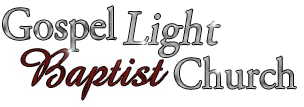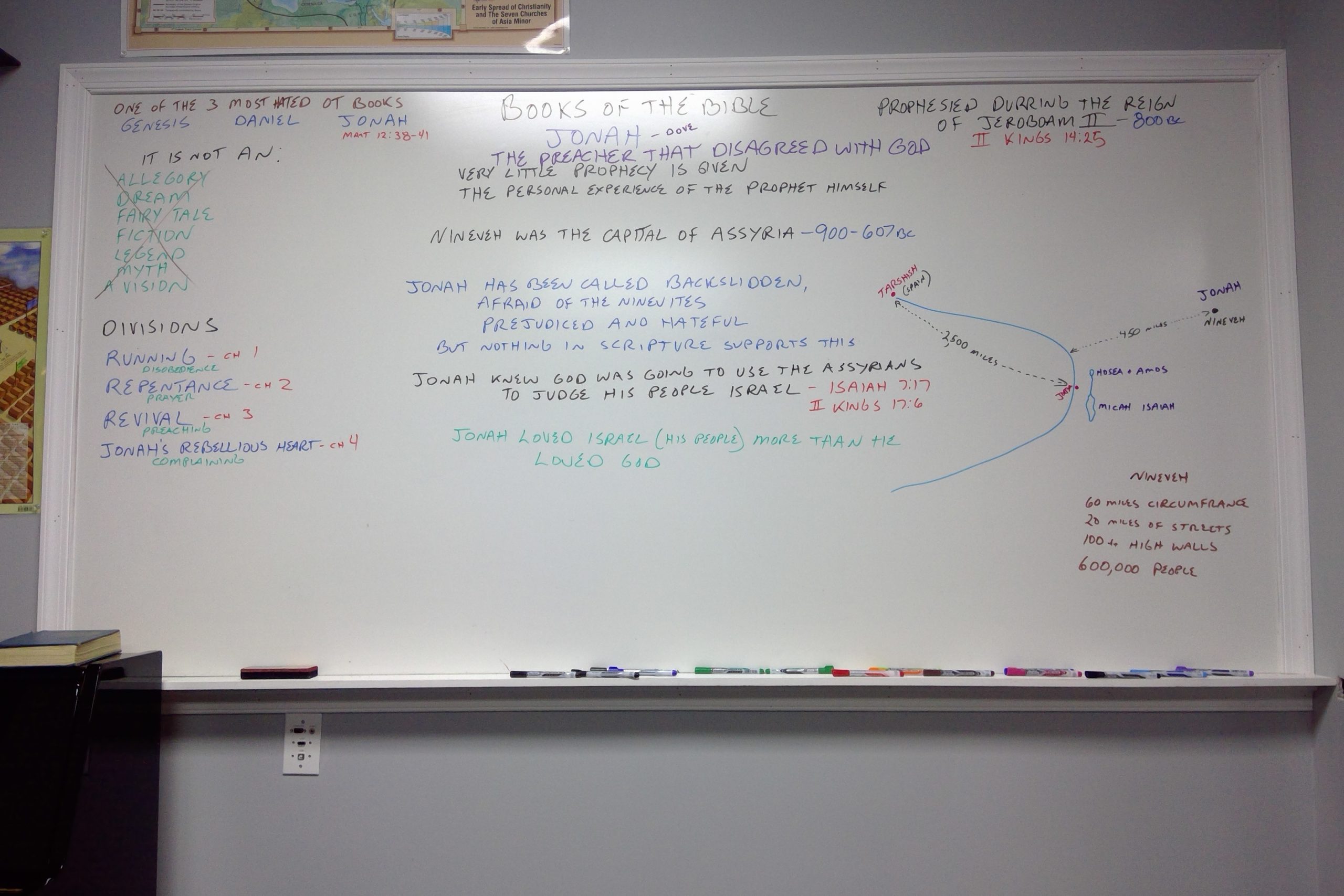091320SS-Book Of Jonah.mp3
Book of Jonah overview
Lesson 32
DATE: Jonah prophesied about 800 B.C. during the reign of Jereboam II. (see 2 Kings 14:25)
His prophecy was in the Northern Kingdom.
He was a contemporary of Hosea.
WRITER: The author, of course, is the Holy Spirit, who used Jonah to write the Book.
– The name Jonah means “dove.”
– Jonah was the son of Amittai. Amittai’s name means truth telling.
– He resided in Gath-Hepher in Zebulun, a village approximately one hour’s walk north of Nazareth.
– Jonah was probably a disciple of Elisha.
– Legend says he was the son of the widow of Sarepta.
– He prophesied the victories of Jeroboam II against Syria.
WRITTEN: The Book of Jonah was written during the time of the great Assyrian Empire’s control of the world.
Nineveh was the capital of the Assyrian Empire.
This world power lasted approximately three hundred years – from 900-607 B.C.
The Book of Jonah is different from the other Minor Prophets in that it gives a personal experience of the prophet himself.
There are only eight actual words of preaching in it. The rest is personal experience symbolizing, of course, the burial and resurrection of Christ, as our Lord Himself stated in Matthew 12:38-41.
THEME: “Jonah’s Revival in Nineveh.” Nineveh was a wicked, Gentile city. Jonah was a Jew who was called of God to preach a revival in Nineveh and to cry aloud against her iniquities.
INTRODUCTION: Jonah is the most maliciously maligned book in the Bible (Matt. 12:39-40; Luke 2:34). It is spoken against by conservatives and liberals alike. The account of Jonah’s been called an allegory, a dream, a fairytale, a fiction, a legend, a myth, and a vision. The credibility of the Lord Jesus Christ rest upon the true story of Jonah and the whale (Matt. 12:40).
Jonah was a prophet in Zebulun of Galilee (Josh. 19:10-13; 2 Kings 14:25; John 7:52) and he lived during the reign of Jeroboam II. The historical account of Jonah portrays prophetic events. The three days and three nights in the belly of the whale picture the death, burial, and resurrection of Jesus Christ (Matt. 12:38-40).
Spiritually, Jonah pictures a believer who is upset with God about his circumstances or his calling in life.
Jonah was called to preach against Nineveh, the capital of Assyria (Isaiah 37:37), but he did not care for the Assyrians. Jonah was not afraid of the Assyrians; he wanted God to destroy them for their wickedness. If God destroyed Nineveh, the Assyrians could not be used as the instruments of judgment against Israel (2 Kings 17:6; Isaiah 7:17). His burden for Israel overruled his call to Nineveh.
- JONAH’S FIRST CALL. Jonah 1:2, “Arise, go to Nineveh, that great city, and cry against it; for their wickedness is come up before me.” We see in Jonah 1:3 that he did not obey God’s call!
- He fled to go to Tarshish. Not being willing to accept the call of God to preach in Nineveh, Jonah went to Joppa, which is now near Tel Aviv, and fled to Tarshish. To most Bible scholars, Tarshish is either Spain or England, probably England. To say the least, he got on a ship to get away from God’s call. He resigned the ministry because of the love he had for Israel.
- Notice in Jonah 1:3 the words, “from the presence of the Lord.” How do you leave God’s presence? God’s presence is left when God’s will is left. God meets you where He wants you to be. Jonah left the will of God.
- Notice the words, “went down.” One always goes down when he leaves the will of God.
- Notice the words, “so he paid the fare.” When a person goes into sin, he must pay a price for it. (Teacher, go through the Bible and think of the men who paid a price for sin, men such as Solomon, David, Saul, etc. Teach the pupils they must always pay for their sins.)
- Notice the words, “went down,” are mentioned again. He went down, paid the fare, and kept going down. When one goes into sin, he keeps going down.
- JONAH’S PUNISHMENT.
- The storm came. Jonah 1:4. Storms always come into our lives when we leave the will of God. Jonah is in the tempest, in a storm on the sea.
- The mariners cast lots. Jonah 1:7. They would cast lots to find out who the guilty party was by using stones or pieces of wood. They would get several stones, put a mark on one of them, shuffle them up, and pass them out. The person who drew the stone with the mark on it was the one they felt was the guilty one. This is much like what we would call “drawing straws.” (Teacher, use stones, matches or straws to show the pupils how this is done.)
- Jonah was cast into the sea. Jonah 1:15.
- He was in the belly of a whale. Jonah 1:17.
It is interesting to note that Paul’s presence saved a shipload of men (Acts 27:44), but Jonah’s presence almost caused the death of a shipload of men (Eccl 9:18).
III. JONAH’S SECOND CALL. Notice in Jonah 3:1, “And the word of the Lord came unto Jonah the second time….” Isn’t it wonderful that God calls the second time! Think how many people in the Bible God called the second time. He is long-suffering and patient. He will not always linger, but He will call the second time.
- Jonah’s focus. Jonah 3:3, 4. Notice Nineveh is city that took 3 days to walk through. Then notice that Jonah began his preaching the first day of his journey through the city. He was focused to preach the 8 word sermon the Lord gave him. Please notice that the greatest revival came because God sent it. The man of God just needs to preach what the LORD tells him to preach.
- Nineveh’s revival. Jonah 3:5-10. What a revival! From the king all the way down to the beasts, they felt revival. This was a huge city. In Jonah 4:11 we find that there were 120,000 people in Nineveh who could not tell their right hand from their left. Maybe these were children age three and under, four and under, two and under, or six and under, but whatever was the age, think how many others there must have been. (Teacher, you might want to give some mathematical thought to this. Some say that this means there were 600,000 in Nineveh. Some say there were as many as three or four million people in Nineveh. Perhaps Nineveh was a city as big as Chicago, or at least as big as Philadelphia, Detroit, etc.) Think of a revival breaking out in one of our big cities to the extent that Nineveh felt it. There is no doubt that this was the greatest revival that any one city ever had in the history of mankind.
JONAH’S SIN. Jonah 4. Here is a tragic story. Jonah had preached, revival had come, but then he became sad. He felt that God had forsaken him because he had predicted that God would overthrow Nineveh. When Nineveh repented and God did not overthrow her, Jonah was saddened. He did not have real, sincere compassion. May God give us a compassion for our cities, our country and the people!
Jonah 4:5-11 So Jonah went out of the city, and sat on the east side of the city, and there made him a booth, and sat under it in the shadow, till he might see what would become of the city.
6 And the Lord God prepared a gourd, and made it to come up over Jonah, that it might be a shadow over his head, to deliver him from his grief. So Jonah was exceeding glad of the gourd.
7 But God prepared a worm when the morning rose the next day, and it smote the gourd that it withered.
8 And it came to pass, when the sun did arise, that God prepared a vehement east wind; and the sun beat upon the head of Jonah, that he fainted, and wished in himself to die, and said, It is better for me to die than to live.
9 And God said to Jonah, Doest thou well to be angry for the gourd? And he said, I do well to be angry, even unto death.
10 Then said the Lord, Thou hast had pity on the gourd, for the which thou hast not laboured, neither madest it grow; which came up in a night, and perished in a night:
11 And should not I spare Nineveh, that great city, wherein are more than sixscore thousand persons that cannot discern between their right hand and their left hand; and also much cattle?
Jonah was mad at God. God was patient because Jonah was honest about his frustrations. God’s questions were designed to get Jonah to learn something about the powerful methods of God.
The book of Jonah reveals the following lessons:
- A selfish and disobedient servant will be corrected by God
- God can save a man from death and hell
- A wicked nation will be judged by God (Psalm 9:16-17)
- The Lord God uses the heathen to punish his people
- There is no respect of persons with God in regards to salvation and repentance (Rom. 2:6-11)
Podcast (sermon-podcast): Play in new window | Download
Subscribe: RSS

